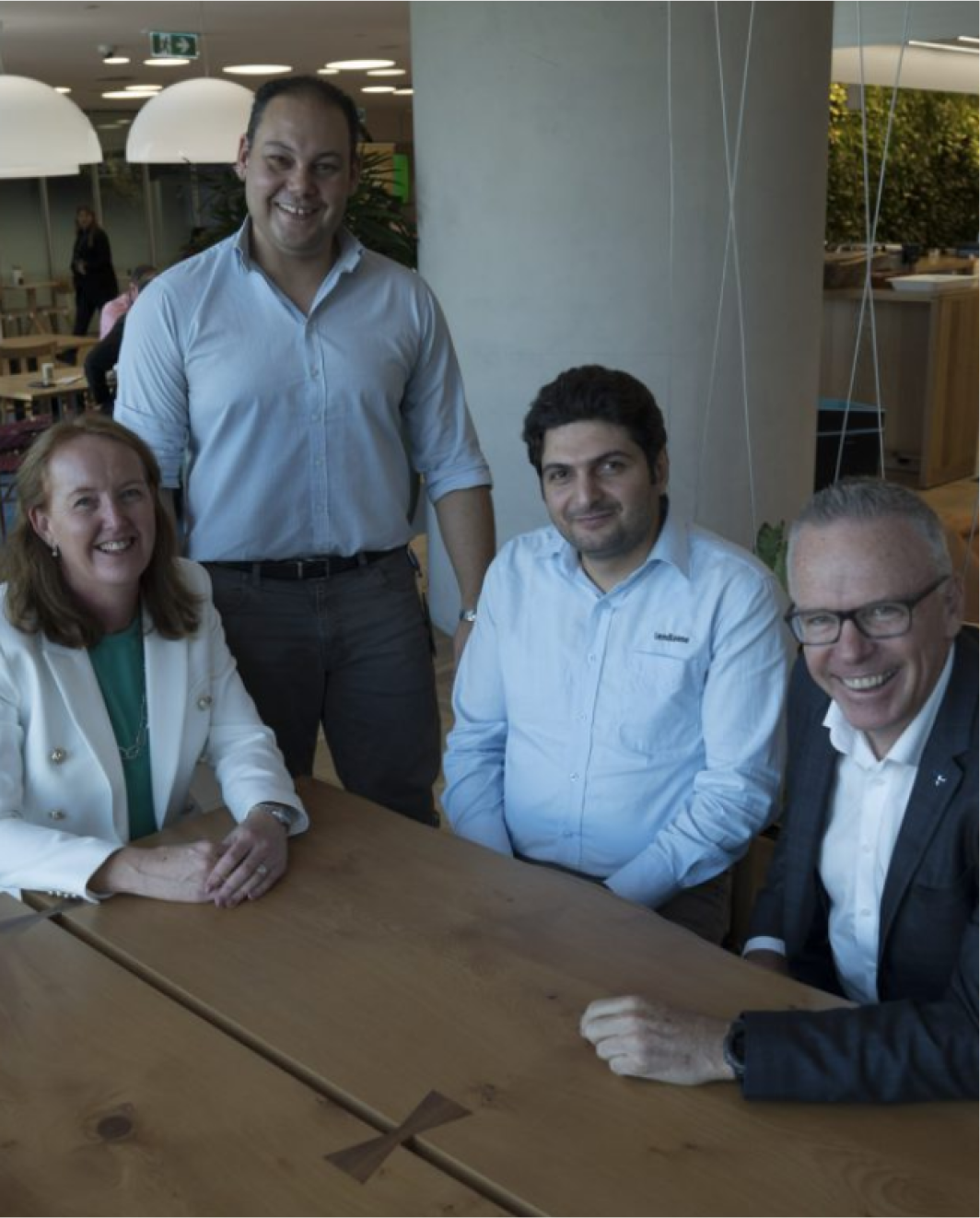How targeted employment programs can fill the holes in Australia’s talent pool
How targeted employment programs can fill the holes in
Australia’s talent pool
Demand for skilled employees in Australia is rapidly growing, A targeted employment program that leverages the skills of people from refugee and asylum seeker backgrounds can be a worthwhile solution for organisations looking to tap top-tier talent.
Targeted employment programs require commitment of time and resources, but they also offer benefits to an organisation and its people.
Australia is experiencing an infrastructure boom spurred by construction and engineering projects worth more than $100 billion. Set to outlast the country’s record-breaking mining boom, the growth in infrastructure has seen the number of engineering jobs double over the last decade. So how do companies make sure they’re reaching every qualified candidate they can, finding the right people and, crucially, retaining them?
The benefits of one solution – participation in targeted employment programs – are three- fold: tapping into a new candidate pool, boosting the bottom line and offering skilled volunteering opportunities to staff as a way to increase retention.
A bigger candidate pool
Many humanitarian visa holders in Australia and elsewhere are highly skilled, with degrees and professional experience in their home countries.
And yet, only 17 per cent are employed 18 months after arriving in Australia. Comparatively, in Germany, politicians estimate that it will take five years for just a quarter of its more than one million refugees to find jobs. For the other 750,000, it may take up to 10 years.
In the past three years, more than 40,000 humanitarian entrants have come to Australia. More than half are of working age and many with tertiary qualifications – 14 per cent of men and 11 per cent of women.
Some simple calculations, and we are left with a large talent pool of qualified professionals, many of whom are highly experienced.
Often, these professionals have demonstrated their resilience, determination and commitment to their areas of interest, overcoming significant obstacles and instability to obtain their qualifications and advance professionally.
“The increasing complexity and demands faced by businesses mean that corporate Australia wants employees who can demonstrate resilience, CareerSeekers Program Director Anne Shimada says.
“Our participants – all humanitarian entrants – may need extra support to develop technical skills, but there is a solid foundation to work from. Our work readiness training and support throughout each internship helps program participants begin to successfully navigate Australian workplaces.”
Fulton Hogan Executive General Manager – People, Safety and Sustainability Sarah Marshall has witnessed first-hand the business case for working with mid- career professionals who have come to Australia on humanitarian visas.
“The benefit has been filling positions in the market where we need as many skilled workers as we can possibly get. When you hear their personal stories and what they’ve already been through, resilience is something that shines through. And when you’re working on an infrastructure project, you need a lot of resilience,” Marshall says.
“They bring maturity, a willingness to work, as well as technical capability.”
Bottom-line boost
The triple bottom line is a valuable tool to assess the level of an organisation’s commitment to purpose alongside profit. However, even just the regular old bottom line gets a boost from diversity.
Local research by the Victorian Equal Opportunity and Human Rights Commission and Deloitte has found that if employees believe diversity is supported at work, their ability to innovate increases by up to 83 per cent and team collaboration by 43 per cent.
In addition, ideas produced by ethnically diverse groups tend to be more effective and feasible. Overall, companies with diverse workplaces perform better when it comes to indicators such as sales revenue, market share and profit.
In instances where company corporate social responsibility policies or commitments to employ marginalised jobseekers have encouraged businesses to work with refugees, experience bears out the research findings and the business benefit soon becomes evident.
“Our interns are contributing to the diversity of our project teams. This is helping to create a better, more inclusive culture on our projects, so for me it’s a win-win,” Marshall says.
Consumers are valuing purpose when they vote with their wallets too. More than half of millennial consumers say their loyalty to a company or brand is impacted by whether the organisation invests in or gives back to the community, while 60% of consumers of all ages will take their business elsewhere if an organisation isn’t socially responsible.
Skilled volunteering as an employment perk
The triple bottom line is a valuable tool to assess the level of an organisation’s commitment to purpose alongside profit. However, even just the regular old bottom line gets a boost from diversity.
Local research by the Victorian Equal Opportunity and Human Rights Commission and Deloitte has found that if employees believe diversity is supported at work, their ability to innovate increases by up to 83 per cent and team collaboration by 43 per cent.
In addition, ideas produced by ethnically diverse groups tend to be more effective and feasible. Overall, companies with diverse workplaces perform better when it comes to indicators such as sales revenue, market share and profit.
In instances where company corporate social responsibility policies or commitments to employ marginalised jobseekers have encouraged businesses to work with refugees, experience bears out the research findings and the business benefit soon becomes evident.
“Our interns are contributing to the diversity of our project teams. This is helping to create a better, more inclusive culture on our projects, so for me it’s a win-win,” Marshall says.
Consumers are valuing purpose when they vote with their wallets too. More than half of millennial consumers say their loyalty to a company or brand is impacted by whether the organisation invests in or gives back to the community, while 60% of consumers of all ages will take their business elsewhere if an organisation isn’t socially responsible.
How targeted employment programs can fill the holes in Australia’s talent pool
How targeted employment programs can fill the holes in Australia’s talent pool
Demand for skilled employees in Australia is rapidly growing, A targeted employment program that leverages the skills of people from refugee and asylum seeker backgrounds can be a worthwhile solution for organisations looking to tap top-tier talent.
Targeted employment programs require commitment of time and resources, but they also offer benefits to an organisation and its people.
Australia is experiencing an infrastructure boom spurred by construction and engineering projects worth more than $100 billion. Set to outlast the country’s record-breaking mining boom, the growth in infrastructure has seen the number of engineering jobs double over the last decade. So how do companies make sure they’re reaching every qualified candidate they can, finding the right people and, crucially, retaining them?
The benefits of one solution – participation in targeted employment programs – are three- fold: tapping into a new candidate pool, boosting the bottom line and offering skilled volunteering opportunities to staff as a way to increase retention.
A bigger candidate pool
Many humanitarian visa holders in Australia and elsewhere are highly skilled, with degrees and professional experience in their home countries.
And yet, only 17 per cent are employed 18 months after arriving in Australia. Comparatively, in Germany, politicians estimate that it will take five years for just a quarter of its more than one million refugees to find jobs. For the other 750,000, it may take up to 10 years.
In the past three years, more than 40,000 humanitarian entrants have come to Australia. More than half are of working age and many with tertiary qualifications – 14 per cent of men and 11 per cent of women.
Some simple calculations, and we are left with a large talent pool of qualified professionals, many of whom are highly experienced.
Often, these professionals have demonstrated their resilience, determination and commitment to their areas of interest, overcoming significant obstacles and instability to obtain their qualifications and advance professionally.
“The increasing complexity and demands faced by businesses mean that corporate Australia wants employees who can demonstrate resilience, CareerSeekers Program Director Anne Shimada says.
“Our participants – all humanitarian entrants – may need extra support to develop technical skills, but there is a solid foundation to work from. Our work readiness training and support throughout each internship helps program participants begin to successfully navigate Australian workplaces.”
Fulton Hogan Executive General Manager – People, Safety and Sustainability Sarah Marshall has witnessed first-hand the business case for working with mid- career professionals who have come to Australia on humanitarian visas.
“The benefit has been filling positions in the market where we need as many skilled workers as we can possibly get. When you hear their personal stories and what they’ve already been through, resilience is something that shines through. And when you’re working on an infrastructure project, you need a lot of resilience,” Marshall says.
“They bring maturity, a willingness to work, as well as technical capability.”

Bottom-line boost
The triple bottom line is a valuable tool to assess the level of an organisation’s commitment to purpose alongside profit. However, even just the regular old bottom line gets a boost from diversity.
Local research by the Victorian Equal Opportunity and Human Rights Commission and Deloitte has found that if employees believe diversity is supported at work, their ability to innovate increases by up to 83 per cent and team collaboration by 43 per cent.
In addition, ideas produced by ethnically diverse groups tend to be more effective and feasible. Overall, companies with diverse workplaces perform better when it comes to indicators such as sales revenue, market share and profit.
In instances where company corporate social responsibility policies or commitments to employ marginalised jobseekers have encouraged businesses to work with refugees, experience bears out the research findings and the business benefit soon becomes evident.
“Our interns are contributing to the diversity of our project teams. This is helping to create a better, more inclusive culture on our projects, so for me it’s a win-win,” Marshall says.
Consumers are valuing purpose when they vote with their wallets too. More than half of millennial consumers say their loyalty to a company or brand is impacted by whether the organisation invests in or gives back to the community, while 60% of consumers of all ages will take their business elsewhere if an organisation isn’t socially responsible.
Skilled volunteering as an employment perk
Purpose-driven business also has clear recruitment and retention benefits, with 80 per cent of business professionals believing that companies have a responsibility to go beyond profit and make a positive impact on society.
Ideally, staff will be involved in that purpose in a hands-on way, contributing to the impact and using their skills in a rewarding capacity. Skilled volunteering is one such avenue.
“Our pre-employment training prepares our participants for the realities of Australian workplaces,” says CareerSeekers CEO John Gelagin.
“Having our employment partners sharing their specialist skills and knowledge as part of that training brings it to life for participants. And staff value the opportunity to participate in meaningful volunteering that clearly has an impact.”
The commitment of employment partners’ people is also integral to the success of the program. Bythe same token those people’s commitment to the business is strengthened when they have an opportunity to bring that passion to work and make a real difference.
“Our staff get as much out of the CareerSeekers program as the participants” says Sarah Marshall “They feel proud of the fact that our organisation is doing something very tangible to help people who have come to Australia as refugees to settle here.”
© 2020 CareerSeekers. All Rights Reserved.
Site by 360tuned.com



